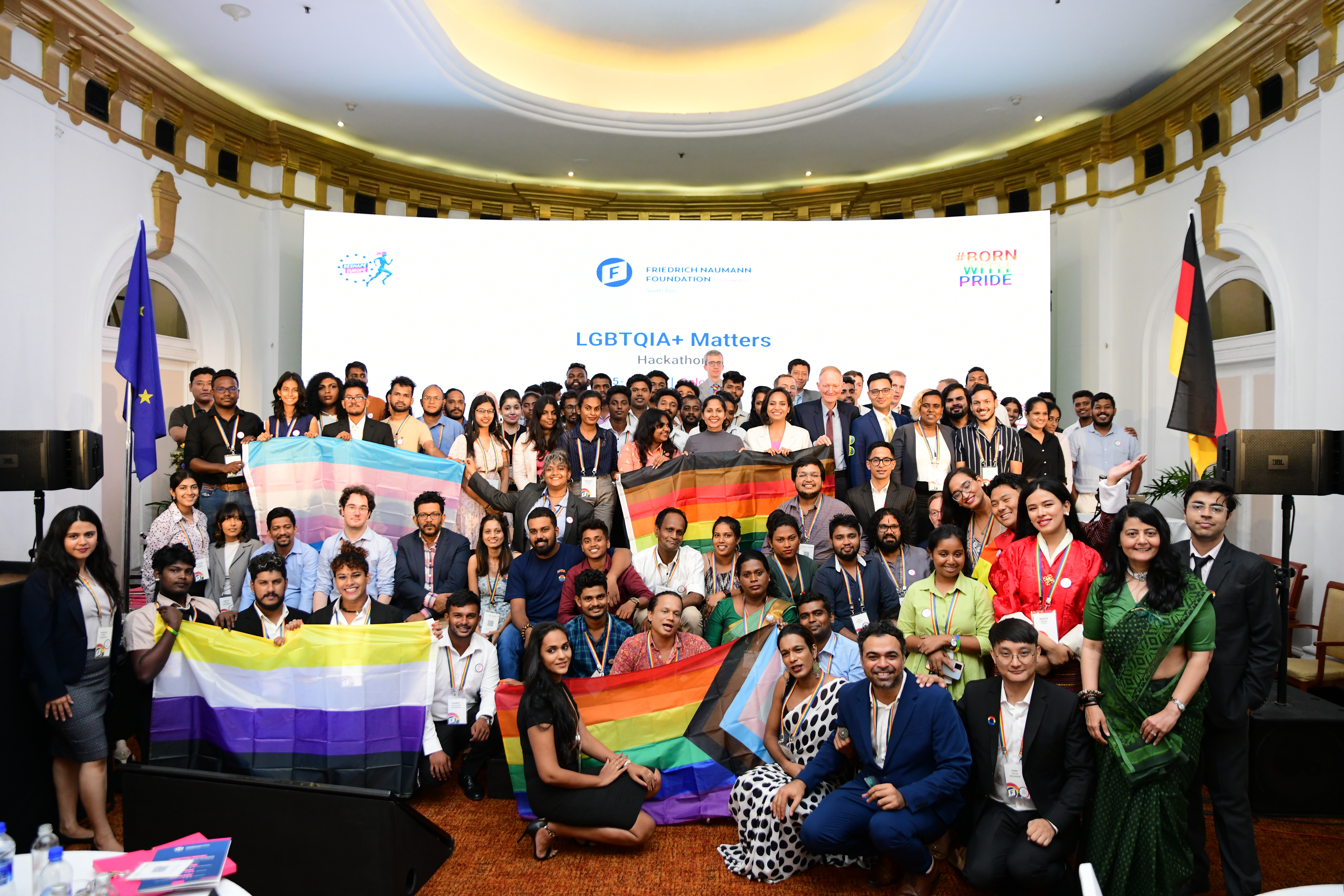LGBTQIA+
Hackathon on Strengthening Dialogue and Cooperation between South Asia and the European Union on LGBTQIA+ Rights

Group Photo at the Hackathon in Colombo, Sri Lanka
© FNF South AsiaGiven the pressing need for openness and dialogue on gender-related issues, the Friedrich Naumann Foundation (FNF) found Colombo a fitting location for its Hackathon on "Strengthening Dialogue and Cooperation between South Asia and the European Union on LGBTQIA+ Rights," held on 6 June 2023. This effort to strengthen communication and sharing between two regions on the question of LGBTQIA+ issues brought together activists, professionals, lawyers, human rights defenders, governmental agencies, and diplomats from 13 countries (five from South Asia, seven from Europe, and one from Oceania) and more than 127 participants.
The event's offerings included pitch presentation training for the Hackathon finalists, an international platform to showcase their ideas, and the opportunity to attend workshops on mental health and online safe spaces. Unique was the combination of competitiveness and cooperation displayed by the four leading teams participating in the Hackathon. The finalists were selected through a rigorous process before traveling to Colombo for a presentation before a five-member international jury comprising Yannick Shetty, Member of the National Council of Austria, Milosz Hodun, Member of the Board of Directors of the European Liberal Forum, Parakram Rana, a Digital Content Creator from Nepal, Dan Grinevics, Political Officer at the EU Delegation to Sri Lanka and the Maldives, and Bhoomi Harendran, Sri Lanka's first Trans-Identifying actress and activist. The hackathon showcased an inspiring display of dedication and earnestness from the competing teams.
Different speakers from South Asia and Europe, in the inauguration session, emphasized the importance of the Hackathon. Dr Carsten Klein, Head of FNF Regional Office South Asia, stated that the event is timely, given the growing discourse on LGBTQIA+ rights in South Asia. Hon Yannick Shetty from the Austrian Parliament acknowledged progress in South Asia's LGBTQIA+ rights and stressed the potential for mutual learning with Europe. The Hon. Premnath C. Dolawatte, a member of the Sri Lankan Parliament, highlighted ongoing discussions to decriminalize homosexuality through the Panel Code Amendment Act. Lars Bredal, Deputy Ambassador of the EU Delegation in Sri Lanka, emphasized the EU's commitment to global equality and non-discrimination.
The four competing teams pitched their ideas on addressing key issues such as education, healthcare access, inclusive workplaces, and creating safe online spaces. In keeping with the theme of the Hackathon, a sense of cross-country cooperation between Europe and South Asia pervaded the event, emerging repeatedly in both formal and informal discussions.
It was apparent that the Hackathon went beyond mere competition, encompassing a comprehensive approach that effectively raises awareness, fostering communication between South Asia and Europe on LGBTQIA+ issues, providing a platform for the LGBTQIA+ communities to present their ideas, facilitating knowledge sharing and establishing networks among various stakeholders, including judges, government officials, diplomats and civil society members. The event was successful in meeting its objectives, providing strong incentive for its continuation. However, it is important to explore methods of intersectionality and inclusivity that engage the LGBTQIA+ community beyond its members in the capitals of South Asian nations.
